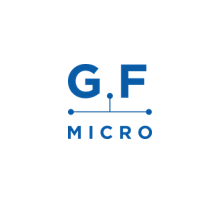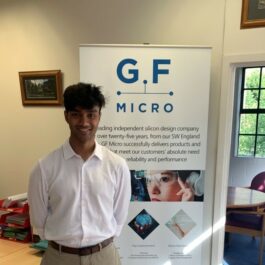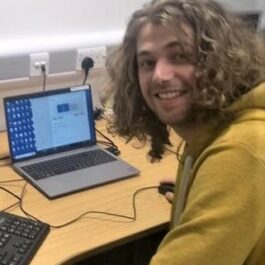GF Micro
We partner with companies, start-ups and academia to design and develop silicon solutions across multi-domain applications GF Micro
Our Scholarships
Placement Location
Stroud or Bristol
Type of Placements Offered
• 12-month placements only
Restrictions/Notes
(1) Requires 12-month placement for 2025/26; (2) Students must be in the penultimate year of their degree; (3) Candidates must specify which job/s they are interested in; (4) Interest in digital and/or analogue IC design preferred
2024/25 Scholarships
At least one new scholarship
Please ensure you specify which job/s you are applying for in your application.
Who we are and what we do

GF Micro has over 30 years experience of providing analogue/digital/mixed signal silicon design services, as well as silicon supply turnkey solutions. We partner with companies, start-ups and academia to design and develop Application Specific Integrated Circuits (ASIC) solutions across multi-domain applications. From feasibility study, specification and design through to fabrication, test and supply, we provide collaboration, expertise and a total commitment to quality. Due to the dynamic nature of the business, no two projects are the same, which means a wide variety of design/implementation learning opportunities as well as being exposed to multiple foundries and technology nodes.
What you could be doing during your work placement
Your placement could be within Analogue Design, Digital Design, or both.
If working in the Analogue Design team, you could:
- Receive training in fundamental analogue design and the use of industry leading Cadence tools.
- Utilise the training received in the design and simulation of analogue circuits on silicon.
- Take your design through the layout phase and on to post-layout simulations.
- Potentially be involved in an ASIC project as it moves through the design process from specification to the design stages and through to tape-out.
If working in the Digital Design team, you could:
- Receive training in fundamental digital design for ASIC and the use of industry leading Cadence and Siemens tools.
- Utilise the training received in the design and simulation of digital circuits on silicon.
- Designing with FPGAs as part of a hardware test environment or as a prototyping tool for re-targeting to ASIC.
- Take your design through the implementation phase and on to gate level simulations.
- Potentially be involved in an ASIC project as it moves through the design process from specification to the design stages and through to tape-out.
For any intern that wishes to pursue mixed analogue and digital design, the placement will be a combination of both the proposed analogue and digital design work.
Meet one of our Scholars

Name: Al
Sponsor: GF Micro
University: University of Southampton
Degree Course: MEng Electronic Engineering with Industrial Studies
What inspires me about electronics?
I’ve always been captivated by the seemingly mystical nature of electronics. The devices we use everyday operate in unintuitive and surprising ways, driving me to study it at the deepest level at university. What excites me most about this field is its complexity and novelty, with constant innovations forming the backbone of modern life.
Why GF Micro?
Initially, committing to a year-long placement at a company that hadn’t run a program like this before seemed like a bit of a risk. But I was eager to take the leap because I was deeply impressed by the people behind GF Micro. It’s a small company, so from the outset, I had the chance to meet most of the team, and what stood out to me was the company’s culture and the way it operates. The collaborative environment, combined with the immense talent of the engineers, made GF Micro a place where I felt supported and valued from day one. Throughout my time there, I was able to work on a wide range of projects, giving me exposure to various technologies and the full ASIC development process. The open and encouraging culture helped me build confidence in my skills while ensuring I always had the opportunity to ask questions and learn. I consider myself fortunate to have experienced such a dynamic and growth-oriented environment during my placement year.
Meet one of our Engineers

Name: Francis
Job Title: Digital Design Engineer
What inspires me about Electronics
As a child I was always fascinated by technology and would always bombard my parent with the same question; how does it work? Pursuing this question kindled my interest in electronics and physics more generally but digital logic and computing was always a focus. In my spare time I would tinker with making simple logic circuits both with actual transistors and the simulator logic.ly (Logic.ly Online Demo). While I was studying my physics degree I got hold of some 74 series logic chips and started working on more substantial projects; it was around this time that I knew I wanted to be a digital logic designer after university.
My work at GF Micro
After graduating, I bumped into a neighbour who worked in this industry and expressed my interest, and as it happened their company was hiring. At GF Micro I am not only finally able to put my skills to real use, but also meet other like-minded and enthusiastic people who welcomed me with respect and kindness. I was put to work straight away on a new project GF Micro had taken on, and immediately felt part of the larger team cooperating to get the job done.
Beyond just designing digital logic I am exposed to the other aspects, namely testing and verification, but also the process of implementation to actually translate a design into silicon and the considerations and compromises that go into that.
GF Micro prides itself on its mixed signal (analogue and digital) design capabilities so the projects taken on by the company are always very varied, and you will never find yourself designing the same chip twice. There are always opportunities to grow your knowledge and to learn something new; exactly what I was after from the beginning.